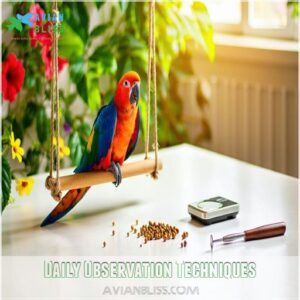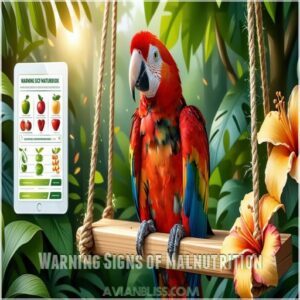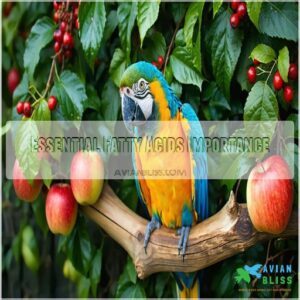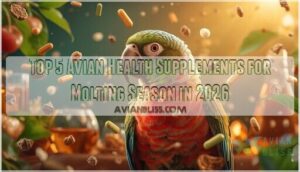This site is supported by our readers. We may earn a commission, at no cost to you, if you purchase through links.
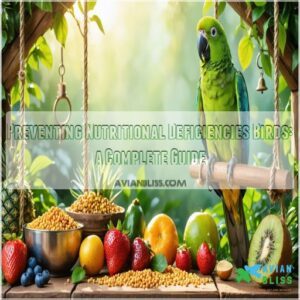
Preventing nutritional deficiencies in birds starts with a varied diet that includes pellets, fresh fruits, and vegetables.
Watch for warning signs like ruffled feathers or lack of interest in food – they’re your bird’s way of waving a red flag.
Just like humans can’t live on pizza alone, your bird needs a balanced menu featuring vitamin A, calcium, and essential fatty acids.
Think of pellets as your bird’s daily multivitamin, while fresh foods add that extra nutritional punch.
The right diet transforms even the pickiest eater into a nutrition champion.
Table Of Contents
- Key Takeaways
- Recognizing Bird Malnutrition
- Key Nutrient Deficiencies
- Creating Balanced Bird Diets
- Preventing Common Health Issues
- Supplementing Bird Diets Safely
- Frequently Asked Questions (FAQs)
- How do you prevent malnutrition in a bird?
- How do you treat vitamin A deficiency in birds?
- How can a healthy diet help a bird?
- What if a bird has a deficiency?
- What are the most common vitamin deficiencies in birds?
- How to fix vitamin A deficiency in birds?
- How are nutritional deficiencies avoided?
- What is the most common vitamin deficiency in birds?
- How are nutritional deficiencies avoided in animals?
- How often should I introduce new foods to birds?
- Conclusion
Key Takeaways
- You’ll need more than just seeds – use pellets as your bird’s foundation diet and supplement with fresh fruits and vegetables to provide essential nutrients including vitamin A, calcium, and fatty acids.
- Watch for malnutrition warning signs like ruffled feathers, weight loss, respiratory issues, and changes in droppings – catching these early helps prevent serious health problems.
- Don’t rely on seed-only diets as they lack crucial nutrients – instead, offer a varied menu that includes pellets, dark leafy greens, carrots, sweet potatoes, and occasional treats.
- You should monitor your bird’s health through daily observations and regular vet checkups – this helps identify potential deficiencies before they become severe and ensures proper supplementation when needed.
Recognizing Bird Malnutrition
You’ll learn how to spot the sneaky signs of malnutrition in your feathered friend, from ruffled feathers to a sudden lack of interest in their favorite seed-covered bell.
This knowledge is important because catching these problems early can prevent serious health issues down the road and keep your bird singing a happy tune.
Daily Observation Techniques
Start your daily checks by observing your bird’s behavior. Is your feathered friend active and alert?
Next, perform a quick feather inspection—are the feathers smooth and vibrant? Dropping analysis is important; healthy droppings offer valuable insights.
Understanding bird health issues is key to preventing deficiencies. Don’t forget beak examination and weight monitoring for signs of deficiency birds.
These daily checks help catch problems early.
Warning Signs of Malnutrition
Is your feathered friend showing signs of malnutrition? Look out for these red flags:
- Weight loss
- Feather problems like dullness
- Beak issues
- Changes in droppings
Dropping analysis can reveal nutrient deficiencies. Catching these malnutrition symptoms early is key. A malnourished bird may exhibit feather dullness and other warning signs of deficiency.
Regular nutrient deficiency tests can help identify issues before they become severe, which is crucial for addressing feather dullness.
Importance of Varied Diet
Think of meal planning for your bird like crafting a colorful salad—food rotation and dietary diversity keep things interesting and healthy.
A balanced bird food mix of fruits, veggies, grains, and pellets guarantees nutrient balance.
Skip seed-only diets to avoid problems.
Follow a bird feeding guide to create a healthy bird diet brimming with balanced nutrition and tasty snacks.
Key Nutrient Deficiencies
When your bird’s diet is missing key nutrients like vitamin A, calcium, or essential fatty acids, their health takes a serious hit.
From brittle bones to dull feathers, these deficiencies can have significant effects.
Understanding these deficiencies helps you make smarter food choices and keep your feathered friend thriving with essential nutrients.
Vitamin a Deficiency Symptoms
Vitamin A deficiency, or hypovitaminosis A, can quietly put your bird’s health in a tailspin.
Watch out for:
- Night blindness making it tricky for your bird to navigate.
- Respiratory issues like wheezing or sneezing.
- Scaly skin or dull, brittle feathers.
- Poor growth in younger birds.
Include vitamin A sources like carrots, sweet potatoes, and leafy greens in their diet!
Calcium Deficiency Effects
Calcium deficiency can wreak havoc on your bird, from weak bones and skeletal issues to poor egg production and soft shells.
Without proper balance, metabolic bone disease or even nerve problems like seizures can develop.
Boost bone health by offering cuttlebones, greens, or calcium supplements. Maintaining the right calcium levels is essential for preventing these issues.
Keep sunlight or UV light handy—it’s key to preventing nutritional deficiencies and calcium-phosphorus imbalances, ensuring overall health through proper metabolic bone balance.
Essential Fatty Acids Importance
While strong bones keep your bird standing tall, proper fatty acid sources play an equally important role in their well-being.
Here’s what balanced Omega-3 and Omega-6 levels do for your feathered friend:
- Support immune system function and help fight off infections
- Maintain gorgeous, healthy feathers and prevent skin issues
- Keep inflammation in check, particularly in blood vessels
Understanding essential vitamins is key for preventing nutritional deficiencies in birds.
Your bird can’t produce these nutrients naturally, so they rely on you to provide them through diet or nutritional supplements, see essential vitamins for more information.
Creating Balanced Bird Diets
You’ll be amazed at how switching from an all-seed diet to a varied menu can transform your feathered friend from a picky eater into a nutrition champion.
Just like you wouldn’t thrive on a diet of potato chips, your bird needs a balanced mix of pellets, fresh fruits, vegetables, and controlled portions of seeds to stay healthy and active.
Pellet-Based Diets Benefits
Research shows your bird can live a longer, healthier life on a balanced pellet diet compared to seeds alone.
Here’s why avian veterinarians recommend pellets as the foundation of bird nutrition: Incorporating premium bird food into their diet can substantially enhance their overall well-being.
These standardized formulas provide consistent nutrient balance, making them ideal for preventing nutritional deficiencies.
| Benefit | Impact |
|---|---|
| Complete Nutrition | Every bite contains balanced vitamins and minerals |
| No Selective Eating | Birds can’t pick out favorites, ensuring balanced intake |
| Scientifically Formulated | Based on extensive nutritional research |
| Extended Lifespan | Documented longer lifespans versus seed diets |
Fresh Food Selection Guidelines
Adding fresh foods to your pellet-based diet requires smart Food Safety Tips and Meal Planning.
To maintain proper Nutrient Balance, here’s what your bird needs:
- Mix dark leafy greens, carrots, and sweet potatoes for maximum nutrition
- Choose Organic Options for Fresh Produce, washing thoroughly before serving
- Offer fresh fruits like papaya in small portions twice daily
- Store cut vegetables separately to prevent cross-contamination
A well-planned parrot food selection is important for a balanced diet.
Keep food fresh by removing uneaten portions after a few hours.
Avoiding Seed-Based Diets
Seeds might look like the perfect bird food, but they’re actually like feeding your feathered friend nothing but french fries.
All-seed diets lack essential nutrients your bird needs to thrive.
Instead of relying on seeds, focus on nutrient balance by offering seed alternatives like pellets as your bird’s main meal.
Keep seeds as healthy treats – they’re fine in small amounts, just not as the main course.
Preventing Common Health Issues
You’ll be amazed at how a proper diet can prevent common bird health issues, from respiratory problems to digestive troubles that might’ve your feathered friend feeling under the weather.
Just like you wouldn’t thrive on a diet of potato chips, your bird needs the right mix of nutrients to maintain those gorgeous feathers and keep that playful personality soaring.
Respiratory Problems Prevention
Beyond a balanced diet, protecting your bird’s respiratory system needs special attention.
Preventing nutritional deficiencies plays a big role in keeping their airways healthy. Here’s what you should watch for:
- Keep your feathered friend away from cigarette smoke and aerosol sprays – they’re like kryptonite for bird lungs
- Make sure there’s good airflow in their space, but avoid direct drafts
- Check for mold in their cage and food regularly
- Consider vitamin A supplements to support trachea function and sinus care
Digestive Issues Solutions
Your bird’s digestive tract health is like a delicate ecosystem.
Watch for signs of trouble: chronic weight loss, regurgitation, or undigested food in droppings might signal conditions like Avian Gastric Yeast or Candidiasis.
Understanding disease transmission methods is essential for maintaining a healthy environment and preventing the spread of illnesses.
Boost nutrient absorption with probiotics and maintain proper gut health through HomeoPet supplements.
Keep the cage clean, adjust feeding portions for chicks, and don’t hesitate to consult your vet about digestive enzymes or stomach soothing treatments.
Feather Health Maintenance
When feathers lose their shine, it’s like a warning light on your car’s dashboard.
Feather health often reflects your bird’s overall nutrition status. Poor plumage quality and abnormal molting processes can signal nutrient deficiencies.
Watch for feather picking or discoloration, which might mean your bird’s missing key vitamins. Regular preening techniques and proper beak care help maintain healthy feathers, but they can’t fix an unbalanced diet.
The importance of recognizing these signs lies in the fact that they can indicate underlying health issues, related to a bird’s overall feather health.
Supplementing Bird Diets Safely
While you’re trying your best to feed your feathered friend a balanced diet, sometimes they’ll need an extra nutritional boost to stay healthy and chirpy.
You’ll want to be smart about supplements though, since too much of a good thing can ruffle more than just their feathers – proper dosing and timing are necessary for your bird’s specific needs.
Choosing Quality Supplements
Smart supplement selection starts with a visit to an avian vet for vitamin testing.
The best quality supplements combine essential vitamins and minerals in a balanced formula that matches your bird’s specific needs.
Look for products containing natural ingredients without artificial additives.
Recent research shows that thorough multivitamins supporting mineral balance help prevent nutritional deficiencies most effectively.
For ideal results, consider bird supplements that are formulated to meet the unique needs of birds.
Always prioritize supplements with proven safety records.
Avoiding Over-Supplementation
More isn’t always better with bird supplements.
Oversupplementation can lead to hypervitaminosis, especially with fat-soluble vitamins that build up in your bird’s body.
You’ll need careful dosage control to prevent toxicity risks.
Monitor your bird for signs like dullness, excessive thirst, and poor coordination.
Maintaining a healthy weight through proper diet is also essential in preventing nutritional deficiencies.
Follow supplement guidelines exactly – think of vitamins like seasoning in cooking: just the right pinch keeps things balanced, and prevents oversupplementation.
Consulting Avian Veterinarians
Every avian vet consultation is like having a personal nutrition coach for your feathered friend.
Working with an avian expert confirms you’re on the right track with bird nutrition deficiency prevention.
Here’s what your vet can do:
- Create custom meal plans based on your bird’s species and health status
- Monitor vitamin and mineral levels through regular health checks
- Guide you through safe dietary switches
- Recommend appropriate supplements when needed
Frequently Asked Questions (FAQs)
How do you prevent malnutrition in a bird?
Feed your bird a diverse diet of pellets, fresh fruits, vegetables, and leafy greens daily.
You’ll want to avoid an all-seed diet and monitor weekly weight changes to catch problems early.
How do you treat vitamin A deficiency in birds?
Boost your bird’s vitamin A intake with fresh carrots, sweet potatoes, and dark leafy greens.
You’ll also want to add quality pellets and consider vet-recommended supplements.
Watch for improvements in feathers and overall health.
How can a healthy diet help a bird?
Like a well-oiled machine, your bird’s health thrives on balanced nutrition.
You’ll see brighter feathers, stronger bones, and better immunity when you’re providing a mix of pellets, fresh fruits, and veggies daily.
What if a bird has a deficiency?
You’ll need to consult an avian vet who can diagnose and treat specific deficiencies.
They’ll recommend supplements, dietary changes, or medication while monitoring your bird’s recovery through regular check-ups and blood tests.
What are the most common vitamin deficiencies in birds?
Birds commonly face vitamin A, D3, E, and K deficiencies.
Your feathered friend’s diet might lack vitamin A, causing respiratory issues.
Your feathered friend’s diet might also lack D3, leading to weak bones, or experience E and K shortages which affect muscles and blood clotting.
How to fix vitamin A deficiency in birds?
To combat vitamin A deficiency, add sweet potatoes, carrots, and dark leafy greens to your pet’s diet.
Switch to fortified pellets and consider supplements under vet guidance.
These changes boost immune health substantially.
How are nutritional deficiencies avoided?
You’ll prevent deficiencies by offering a varied diet of pellets, fresh veggies, and fruits.
Don’t forget to mix in some nuts and seeds moderately, and consider supplements if your vet recommends them.
What is the most common vitamin deficiency in birds?
Vitamin A deficiency stands out as birds’ most frequent nutritional shortfall. When your feathered friend isn’t getting enough, they’ll show signs like dull feathers, respiratory issues, and night blindness.
How are nutritional deficiencies avoided in animals?
Track your pet’s regular meals, offer diverse food choices, and incorporate essential supplements when needed.
It’s smart to consult with your vet about balancing minerals and vitamins in their daily diet.
How often should I introduce new foods to birds?
Like testing waters in a new pool, introduce one new food every 3-4 days.
You’ll want to offer it during their most active times and watch their response before moving to another option.
Conclusion
You might think preventing nutritional deficiencies in birds is overwhelming, but it’s actually quite manageable with the right approach.
By combining quality pellets with fresh fruits and veggies, you’re already ahead of the game.
Keep an eye on your feathered friend’s behavior and appearance, and don’t hesitate to consult an avian vet if something seems off.
Remember, a balanced diet today means a healthier, happier bird tomorrow. Your commitment to proper nutrition will reward you with years of joyful companionship.
- https://www.merckvetmanual.com/bird-owners/disorders-and-diseases-of-birds/nutritional-disorders-of-pet-birds
- https://www.petmd.com/bird/conditions/digestive/c_bd_Vitamin_A_Deficiency
- https://www.dvm360.com/view/how-i-diagnose-and-manage-nutritional-disease-birds-proceedings
- https://www.catandbirds.com/nutritional-diseases-in-birds
- https://www.versele-laga.com/en/gb/for-your-animal/cage-and-aviary-birds/care/how-to-recognise-and-avoid-calcium-deficiency-in-birds

